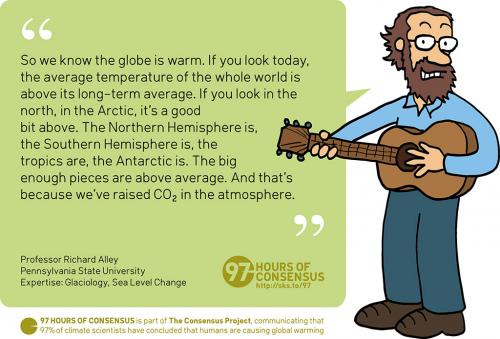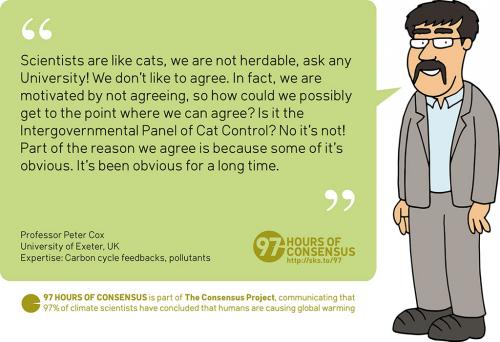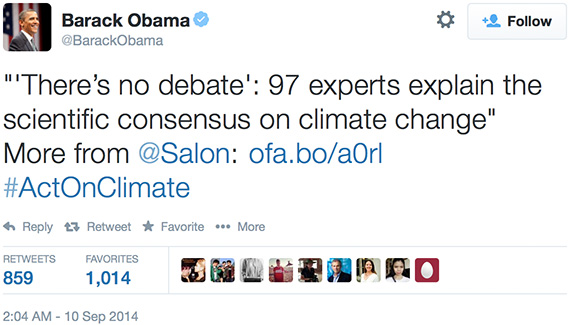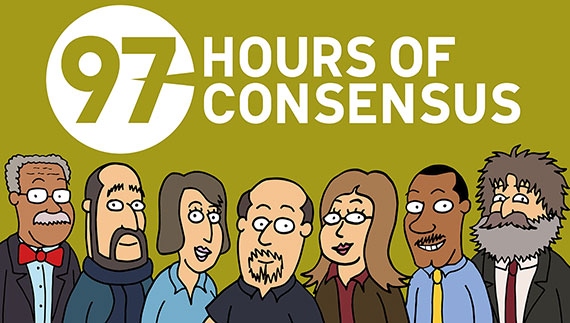Call to climate scientists: submit your quote for 97 Hours of Consensus 2015
Posted on 19 January 2015 by John Cook
On 7 September 2014, we launched 97 Hours of Consensus. Every hour for 97 consecutive hours, we published a cartoon of a climate scientist with a quote about climate change. We also published a very cool interactive webpage. Our purpose: to raise awareness of the scientific consensus on human-caused global warming.
The series was an amazing success. We reached millions of people through social and mainstream media, including President Obama tweeting about 97 hours to 43 million followers:
On 7 September 2015, we're repeating 97 Hours of Consensus with another 97 climate scientists. But with a different approach. This time, we're asking climate scientists to submit their quotes to us. So this is my call to action to the climate science community. If you're a climate scientist who:
- has something to say about the issue of human-caused global warming,
- and is interested in your words reaching millions of people,
- and would like to be drawn in cartoon form
then submit your quote in our 97 Hours of Consensus Submission Form.
Another difference to 2014 is I'm hoping to draw more individualised caricatures. Some of the most popular cartoons captured something unique about that scientist. Richard Alley's guitar. John Bruno's flip flops. Simon Donner's hair attracted many comments (I scolded Simon quite sternly at the AGU Fall Meeting after learning he'd had a haircut).

So our submission form includes a text box for instructions on how to individualise your caricature. Do you have a favourite piece of clothing? A hobby? Are you an obsessive sports fan (like me inadvertently supporting the Brisbane Broncos in our coral reef video)? Let me know how you'd like to be drawn!
Also among the most popular cartoons were the witty quotes. Jen Francis' chills, Ken Calderia's old ladies and Peter Cox's cats were all big hits.

So don't be afraid to be creative and funny! But especially important is to be concise. Ideally, try to keep your quote to less than 400 characters. Bigger than a tweet but small enough to comfortably fit into a speech bubble!
To climate scientists who were drawn in the last 97 Hours of Consensus, please do submit a new quote. We'd like to emphasize scientists who weren't drawn in 2014, but great quotes are equally important so don't be shy just because you were drawn last year (and yes, I'll redraw you according to your new instructions). However, if we receive more than 97 new scientists, then we'll prioritise based on how concise and clever the quote is!
Thanks, and I look forward to reading all your quotes, and drawing you all! :-)































 Arguments
Arguments
































The consensus study is getting old. The consensus is growing. Seems like you should be doig at least 98, not 97, scientist quotes.
The concept of a "Climate Change Debate" allows the doubters too much wriggle room. The reality is that there is no longer a debate about anthropogenic climate change. We should become more aggressive in our stance. We should insist on discussing the "fact" of CC. The small element of doubt has been exploited by those in denial of CC. The result is that the public are genuinely confused.
Greg, that is actually what we found in our 2013 study - there has been an overwhelming consensus in peer-reviewed climate papers since the early 1990s, and it's getting stronger. So by 2013, it has grown to about 98%. The 97.1% figure we quote is the average over the 21 year period.
Naomi Oreskes might accuse me of erring on the side of least drama by emphasising 97.1% rather than 98%. But then, it's hard to imagine the reaction to our consensus study containing any more drama! :-)
Jack, the communication of the 97% consensus is to address the fact that the public think there is a 50:50 debate (although there's some evidence that public perception is now higher than that). So just the mere communication of that single number - 97% agreement - is a significant and powerful statement. That single number implicitly communicates what you're talking about - there is no longer a debate about human-caused global warming. There is a great deal of social science evidence demonstrating just how powerful consensus is as a simple, effective means of communicating the realities of climate change.
Many of the deniers are changing their position to: yes the globe is warming and humans are contributing to the warming, but the consequences are not so great that extreme action has to be taken now. Some also claim that taking action will destroy the economy.
is there any possibility of asking the submitters to focus on the effects already happening, but with specifics; e.g., the increased wandering of the jet stream being caused by a decreased temperature difference between the Artic and more southern water.
Also, could it be opened to others, such as economists, who can deal with the impacts of not taking action and of mitigations/adaptation.
kmoyd, great comment! There are a couple of answers:
Firstly, climate denial exists in a quantum state. That means many denialists might be admitting one day that humans are contributing to global warming, but you'll find the next day they are back to claiming global warming stopped in 1998. There are many stages of denial and denialists can be observed to subscribing to any number of these stages, even if they're mutually inconsistent.
Secondly, upon your suggestion of asking the scientists to focus on a specific topic, I confess the words "cat herd" immediately came to mind :-) Scientists tend to be an independent, strong-minded bunch (after all, they are the original genuine skeptics). Directing scientists in a particular direction may prove as difficult as herding cats.
However, I think what you will find in this next iteration of 97 Hours, there'll be a much greater diversity of focus in the quotes. In the first 97 Hours, we hunted for quotes ourselves and we tended to restrict ourselves to quotes endorsing the scientific consensus on human-caused global warming. That imposed a certain uniformity on the set of 97 quotes.
This time, scientists are submitting the quotes themselves. So, as a cat herd is wont to do, I'm already seeing a lot more diversity in the focus of the quotes. Scientists tend to be talking more from their own particular area of expertise.
And I'm getting some pretty whacky suggestions on how they'd like to be drawn, which sounds like a lot of fun. One scientist (who featured in the first 97 Hours) asked if he could be drawn bungee jumping. It shouldn't be too hard for people well-versed in the climate issue to figure out who that might be.
kmoyd,
I would ask you to consider the economic arguments in an even more challenging way.
Delaying reduction of impacts will increase the future consequences. The ones benefiting in the current generation from the delay, from the increased trouble-making, are not going to be suffering the future consequences. So any comparison of anyone's present day lost opportunity to future costs to others is clearly a red-herring type of argument. It is fundamentally unacceptable for any generation to make things worse for a future generation, no matter how much richer the current generation thinks it could be.
The same reasoning can be used to argue that it is unacceptable for anyone in the current global generation to benefit in a way that is harmful to others rather than helping them to a sustainable better life.